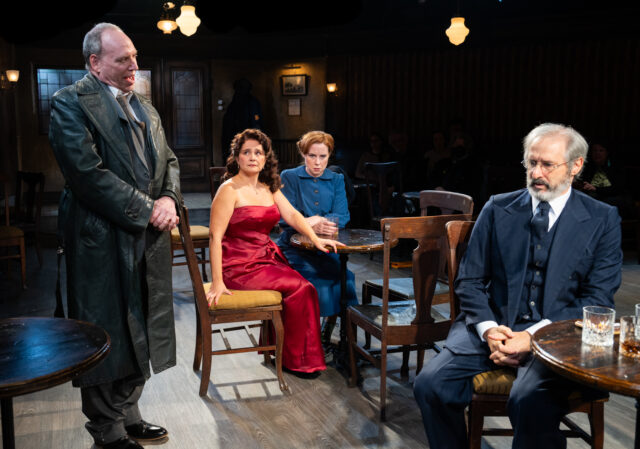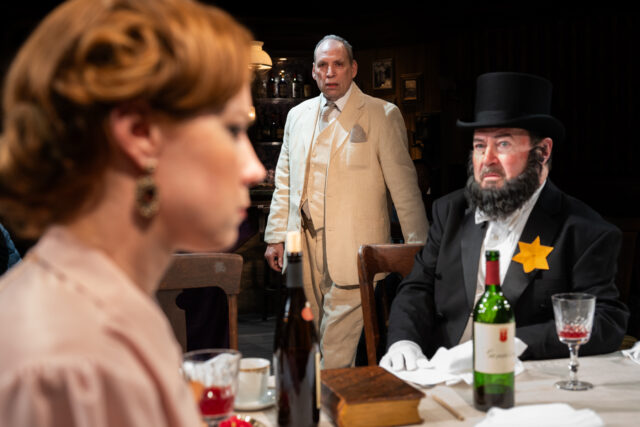
Volksdeutscher F. X. Wohltat (Daniel Oreskes) has strong words for Dr. I. C. Gotterman (Richard Topol) in King of the Jews (photo by Russ Rowland)
KING OF THE JEWS
HERE Arts Center
145 Sixth Ave.
Tuesday – Sunday through November 18, $99
here.org
Leslie Epstein’s theatrical adaptation of his controversial 1979 novel, King of the Jews, arrives at a perilous moment in Jewish history, as Israel responds to the horrific October 7 Hamas attack that killed at least 1,200 people and took more than 200 hostages. The current rise in antisemitism, specifically related to Israel’s bombing of Gaza and preparation for a ground incursion to destroy the terrorist organization, is palpable throughout the show, which takes place in occupied Poland in 1939. Director Alexandra Aron’s immersive staging is powerful and hard-hitting, but, alas, the narrative, despite a strong start, can’t quite live up to its promise.
Set designer Lauren Helpern has transformed HERE’s upstairs theater into the Astoria Café, the only Jewish nightclub allowed to remain open in pre-WWII Lodz, Poland. The audience sits at small tables and on benches, surrounded by a mirrored bar. On stage is music and comedy; several tables are reserved for the characters, who eat, drink, debate issues, and watch the entertainment.
When you first walk into the space, clarinetist and saxophonist Matt Darriau of the Klezmatics and pianist Raphael D’Lugoff are playing jazz tunes. (They start thirty minutes before showtime, so it’s worth coming early.) You can take a walk around the room and check out the stocked bar, a classic old telephone, and a Polish menu.
The Astoria is owned by the sycophantic Fried Rievesaltes (Dave Shalansky); his wife, vocalist Phelia Lubliver (Rachel Botchan), is the star attraction. The staff includes waiter Ferdinand Philosoff (John Little), who is not the best of philosophers; cook Herman Gutfreind (JP Sarro), who plays the trumpet and euphonium and spouts Marxism any chance he gets; and cellist and violinist Dorka Kleinweiss (Erica Spyres). The café regulars are Rabbi Martini (Allen Lewis Rickman) and Rabbi Verble (Robert Zukerman), who enjoy arguing and complaining; Schotter (David Deblinger), who tells awful jokes about the Jews and “Hamilton,” not wanting to say the name of the German führer; Hungarian amateur pianist M. M. Schpitalnik (Jonathan Spivey); and Dr. I. C. Gotterman (Richard Topol), who is infatuated with Phelia.
One evening, a young boy (Wesley Tiso) dives in through the window. It’s right around curfew, when the Death’s Headers of the SS patrol the streets. Volksdeutscher F. X. Wohltat (Daniel Oreskes) arrives, looking for the boy, but the people in the café have hidden him (rather poorly). A big bear of a man, Wohltat proclaims he is there to help the Jews.
“You see, I know our Jews! And perhaps some of you know me? I was brought up here, in these streets, the same as you,” he boasts. “I am not ashamed to say that even though the blood of the Reich flows in my veins, I played boyish games and swam in the blue Dolna with members of your community. This is my beloved city, too. I am your neighbor, your friend.”
Pretending not to see the boy, Wohltat orders the Jews to form a Judenrat, “a council of ministers to rule Jewish life. . . . Of course, during wartime, we might have to ask them to carry out this task or that task. Like turning over someone who runs away, or anyone who tries to hide him. But you must agree: better for you Jews to do things yourselves than have others — like our friend the Obersturmfuhrer — do them for you.”
The Jews in the café discuss whether they should give up the boy or agree to the Judenrat, a council of elders that would make them collaborators with the enemy, who they refer to as the Blond Ones. They ultimately decide to keep the boy, so soon they are choosing their officers and a president. The doctor is ultimately put in charge. Infighting, backstabbing, and doubt ensue as Wohltat asks them to pick a hundred Jews to be sent to work while promising that they will all eventually have a new homeland in Madagascar.
The nature of their bargain is clear: “If a Jew puts his head into the mouth of a leopard, is the leopard liable because it is his nature to chew?” Rabbi Martini asks.

Rabbi Martini (Allen Lewis Rickman) doesn’t like what he sees in King of the Jews (photo by Russ Rowland)
Epstein, who comes from an eminent family — his father, Philip G. Epstein, and uncle, Julius J. Epstein, cowrote such films as The Man Who Came to Dinner, Casablanca (with Howard Koch), and Arsenic and Old Lace, and his son, Theo, was the GM who helped guide the Boston Red Sox to their first World Series championship in more than eighty years in 2004 — does not make things easy for the audience. The title character, inspired by the real-life council elder Chaim Mordechaj Rumkowski, is a deeply conflicted man and complicated figure; he brazenly and embarrassingly lusts after Phelia and is distressed that he appears to have lost his magic touch as a doctor. He is ably portrayed by Topol, who has become a go-to actor in Jewish dramas, playing Jewish men in Paula Vogel’s Indecent, Clifford Odets’s Awake & Sing!, and Joshua Harmon’s Prayer for the French Republic, with Tadeusz Slobodzianek’s Our Class opening at BAM in January, about a 1941 Polish pogrom.
The rest of the cast is solid, with fine turns by Botchan (Indecent, The Sorceress) and Spyres (Once, Into the Woods), who must consider sacrifices only women can make, and the always excellent Oreskes (Oslo, The Seagull / Woodstock, NY), who lets Wohltat’s evil build scene by scene.
Aron (A Night in the Old Marketplace, Naked Old Man) puts the audience right in the midst of it all, making the air of antisemitism stifling. Zach Blane’s lighting, Jane Shaw’s sound, and Oana Botez’s costumes — complete with big yellow Stars of David on the Jews’ clothing — add to the overall feeling of impending doom. The café denizens are faced with a nearly impossible situation, but their individual concerns, worries, fears, and hopes lack consistency; the characters are not quite fully drawn. In the second act — the audience has to exit the house after the first act, returning to a slightly changed layout — the characters’ reactions to Wohltat’s orders seem more random, not as believable, perhaps in part because Epstein had to trim the novel’s plot considerably for the play.
King of the Jews does raise critical issues, especially in light of what is happening in Israel right now and the response around the world, but it falls short of being the important play it could have been. Nevertheless, certain lines resonate deeply.
“Be brave, stand up, Jews,” the doctor says. “Who can say what a Jew is?” Philosoff asks. And Rabbi Verble sums it all up when he declares, “We two rabbis herby forbid the King of Heaven from punishing his people any longer. It’s enough! . . . We demand that the suffering stop!”
[Mark Rifkin is a Brooklyn-born, Manhattan-based writer and editor; you can follow him on Substack here.]